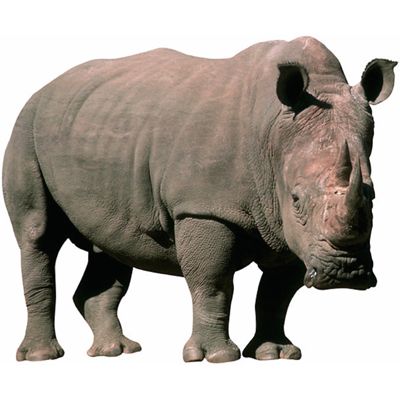From Longman Dictionary of Contemporary Englishrhinocerosrhi‧no‧ce‧ros /raɪˈnɒsərəs $ -ˈnɑː-/ noun (plural rhinoceros or rhinoceroses) [countable]  HBAa large heavy African or Asian animal with thick skin and either one or two horns on its nose → hippopotamus
HBAa large heavy African or Asian animal with thick skin and either one or two horns on its nose → hippopotamus
 HBAa large heavy African or Asian animal with thick skin and either one or two horns on its nose → hippopotamus
HBAa large heavy African or Asian animal with thick skin and either one or two horns on its nose → hippopotamusExamples from the Corpus
rhinoceros• I hear that a rhinoceros flew along the Mississippi in a pink balloon, this morning.• I though it was a rhinoceros coming for me in the dark.• Among other species to be seen are elephants, buffalo, rhinoceros, impala, giraffe, zebra, baboons and monkeys.• Here, it is not doing duty for a use of rhinoceros but rather for a mention of it.• Notable among these are ivory, shells, rhinoceros horn, coral, amber and jet.• I always thought that was rhinoceros horn.• Einstein would probably have been as hopeless as anybody in working out how to catch a woolly rhinoceros.Origin rhinoceros (1200-1300) Latin Greek, from rhis “nose” + keras “horn” 
